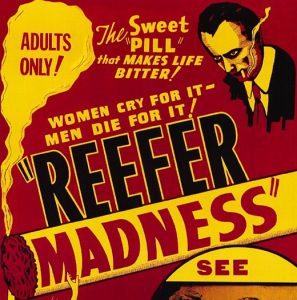From an editorial in the Decatur (Alabama) Daily:
The U.S. is in the middle of an opioid epidemic.
According to the U.S. Centers for Disease Control and Prevention, from 2014 to 2015, overdose-related deaths from one opioid alone, heroin, increased by 20.6 percent, with nearly 13,000 people dying in 2015.
Meanwhile, there remain no known marijuana overdose deaths, according to the Drug Enforcement Administration, and studies have found states that have legalized marijuana have seen a decrease in opioid-related deaths.
So, of course, U.S. Attorney General Jeff Sessions has decided to ramp up the fight against legal marijuana.
On Thursday, Sessions rescinded the Obama administration’s relatively hands-off policy toward states that have legalized marijuana for either medical or recreational use. Federal prosecutors where marijuana is legal under state law will now be free to decide for themselves how aggressively to enforce federal laws.
 The editorial points to a post at Wonkblog that says SWAT raids of marijuana dealers have caused more deaths than marijuana itself. “Since 2010, At least 20 SWAT raids involving suspected marijuana dealers have turned deadly,” it says. The number of deaths attributed to marijuana overdoses, of course, remains at zero. For all time. Apparently it’s not possible to kill yourself with too much pot.
The editorial points to a post at Wonkblog that says SWAT raids of marijuana dealers have caused more deaths than marijuana itself. “Since 2010, At least 20 SWAT raids involving suspected marijuana dealers have turned deadly,” it says. The number of deaths attributed to marijuana overdoses, of course, remains at zero. For all time. Apparently it’s not possible to kill yourself with too much pot.
But what is Sessions doing about the opioid crisis? Which, according to the New York Times, is “the deadliest drug crisis in American history. Overdoses, fueled by opioids, are the leading cause of death for Americans under 50 years old — killing roughly 64,000 people last year, more than guns or car accidents, and doing so at a pace faster than the H.I.V. epidemic did at its peak.”
Well, pretty much all the stuff the government has been doing all these years that didn’t work. This happened in November:
Attorney General Jeff Sessions on Wednesday announced a variety of measures to deal with the nation’s opioid problem which amount to: Pick ’em up, lock ’em up, throw away the key. He was, in short, reigniting the failed “war on drugs.”
Sessions held a press conference at the Department of Justice focusing on what he called “the worst drug crisis in American history,” offering a plan with about the worst approach to this problem – proven to have failed countless times over the past 100 years.
It gets better.
To add dark comedy to this unfolding tragic drama, we are also told that Kellyanne Conway, the supremely over the top White House adviser and spokesperson, will be put in charge of the varied efforts to control the opioid epidemic. In effect, is she being named the unofficial White House “drug czar,” since none has been officially appointed? Maybe this would seem comic were not 142 Americans dying of overdoses every day, over 60,000 in the past year, which is more than homicides and deaths from motor vehicle accidents combined. Sessions called Conway “exceedingly talented,” for what I do not know.
That was November, though. This happened this week:
In May 2016, Taylor Weyeneth was an undergraduate at St. John’s University in New York, a legal studies student and fraternity member who organized a golf tournament and other events to raise money for veterans and their families.
Less than a year later, at 23, Weyeneth, was a political appointee and rising star at the Office of National Drug Control Policy, the White House office responsible for coordinating the federal government’s multibillion dollar anti-drug initiatives and supporting President Trump’s efforts to curb the opioid epidemic. Weyeneth would soon become deputy chief of staff.
His brief biography offers few clues that he would so quickly assume a leading role in the drug policy office, a job recently occupied by a lawyer and a veteran government official. Weyeneth’s only professional experience after college and before becoming an appointee was working on Trump’s presidential campaign.
In other words, don’t expect to see the opioid crisis to get better anytime soon.
But something else has been nagging at me; this happened in December.
After two years of painstaking investigation, David Schiller and the rest of the Drug Enforcement Administration team he supervised were ready to move on the biggest opioid distribution case in U.S. history.
The team, based out of the DEA’s Denver field division, had been examining the operations of the nation’s largest drug company, McKesson Corp. By 2014, investigators said they could show that the company had failed to report suspicious orders involving millions of highly addictive painkillers sent to drugstores from Sacramento, Calif., to Lakeland, Fla. Some of those went to corrupt pharmacies that supplied drug rings.
The investigators were ready to come down hard on the fifth-largest public corporation in America, according to a joint investigation by The Washington Post and “60 Minutes.â€
And then this happened:
Instead, top attorneys at the DEA and the Justice Department struck a deal earlier this year with the corporation and its powerful lawyers, an agreement that was far more lenient than the field division wanted, according to interviews and internal government documents. Although the agents and investigators said they had plenty of evidence and wanted criminal charges, they were unable to convince the U.S. attorney in Denver that they had enough to bring a case.
In other words, the DEA Denver division was about to bring the hammer down on a dirty company and major opioid distributor, and the Washington DEA Office and Justice Department intervened to let the company off the hook. One suspects some favors were done for somebody. But nobody’s gonna sell any of that marijuana if Jeff Sessions has anything to say about it.
